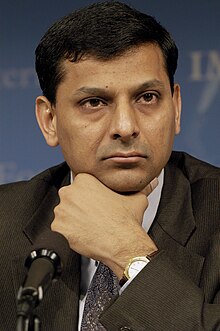
Back راغورام راجان Arabic راجورام راجان ARZ ৰঘূৰাম ৰাজন Assamese Raghuram Rajan German Raghuram Rajan Esperanto Raghuram Rajan Finnish Raghuram Rajan French रघुराम राजन Hindi Raghuram Rajan ID Raghuram Rajan Italian
Raghuram Rajan | |
|---|---|
 Rajan in 2004 | |
| 23rd Governor of the Reserve Bank of India | |
| In office 4 September 2013 – 4 September 2016 | |
| Prime Minister | Manmohan Singh Narendra Modi |
| Preceded by | Duvvuri Subbarao |
| Succeeded by | Urjit Patel |
| 15th Chief Economic Adviser to the Government of India | |
| In office 10 August 2012 – 4 September 2013 | |
| Prime Minister | Manmohan Singh |
| Preceded by | Kaushik Basu |
| Succeeded by | Arvind Subramanian |
| 7th Chief Economist of the International Monetary Fund | |
| In office September 1, 2003 – January 1, 2007 | |
| Preceded by | Kenneth Rogoff |
| Succeeded by | Simon Johnson |
| Personal details | |
| Born | 3 February 1963 Bhopal, Madhya Pradesh, India |
| Spouse | Radhika Puri |
| Education | Indian Institute of Technology, Delhi (BTech) Indian Institute of Management, Ahmedabad (PGDM) Massachusetts Institute of Technology (PhD) |
| Signature | |
Raghuram Govind Rajan (born 3 February 1963) is an Indian economist and the Katherine Dusak Miller Distinguished Service Professor of Finance at the University of Chicago's Booth School of Business.[1][2][3][4] Between 2003 and 2006 he was Chief Economist and director of research at the International Monetary Fund.[3] From September 2013 through September 2016 [3] he was the 23rd Governor of the Reserve Bank of India. In 2015, during his tenure at the RBI, he became the Vice-Chairman of the Bank for International Settlements.[5]
At the 2005 Federal Reserve annual Jackson Hole conference, three years before the 2008 crash, Rajan warned about the growing risks in the financial system, that a financial crisis could be in the offing, and proposed policies that would reduce such risks.[6] Former U.S. Treasury Secretary Lawrence Summers called the warnings "misguided" and Rajan himself a "luddite".[7] However, following the financial crisis of 2007–2008, Rajan's views came to be seen as prescient, and he was extensively interviewed for the Academy Awards-winning documentary Inside Job (2010).
In 2003, Rajan received the inaugural Fischer Black Prize, given every two years by the American Finance Association to the financial economist younger than 40 who has made the most significant contribution to the theory and practice of finance. His book, Fault Lines: How Hidden Fractures Still Threaten the World Economy, won the Financial Times/Goldman Sachs Business Book of the Year award in 2010. In 2016, he was named by Time in its list of the '100 Most Influential People in the World'.[8][9]
- ^ "I am an Indian citizen: Raghuram Rajan". The Hindu. 30 October 2013. Quote: "I am an Indian citizen. I have always been an Indian citizen. I always held an Indian passport. I held an Indian diplomatic passport when my father was in the foreign service and when I travelled on behalf of the Ministry of Finance. I have never applied for the citizenship of another country. I have never been a citizen of another country and have never taken a pledge of allegiance to another country."
- ^ Crabtree, James (30 August 2013) Raghuram Rajan, academic in a raging storm The Financial Times (requires a subscription), Retrieved 11 November 2014
- ^ a b c "Raghuram G. Rahan: Katherine Dusak Miller Distinguished Service Professor of Finance". University of Chicago, Booth School of Business. Archived from the original on 6 May 2019. Retrieved 18 March 2017.
- ^ "Faculty members recognized with named, distinguished service professorships". University of Chicago Booth School of Business. Retrieved 2 February 2017.
- ^ "RBI Governor Raghuram Rajan first Indian to be appointed BIS Vice Chairman". The Economic Times. Retrieved 2 February 2017.
- ^ "The Economic Crisis and the Crisis in Economics". www.eatonak.org.
- ^ Lahart, Justin (2 January 2009). "Mr. Rajan Was Unpopular (But Prescient) at Greenspan Party". The Wall Street Journal.
- ^ Raghuram Rajan in TIME's 100 most influentials list Business Standard, 22 April 2016
- ^ Raghuram Rajan, Sania Mirza, Sundar Pichai Among Times 100 Most Influential People Huffington Post, 22 April 2016
© MMXXIII Rich X Search. We shall prevail. All rights reserved. Rich X Search